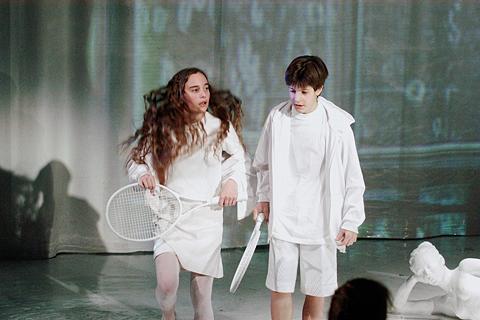|
<< -- 5 -- David Wilkins THE THINNEST TIGHTROPE

Klein Ottokár's Quint is the major disappointment of the production. He is made to look like an over-the-hill lounge lizard dressed to fleece unsuspecting pensioners on the Costa del Sol. His 'calls' to Miles had nothing of the creepy allure of Langridge, Bostridge or even (though I find that voice difficult to take -- even for 'ready money') Peter Pears. When pushing Miles' bed around the stage and fiddling with the boy's shirt buttons, he seemed under-directed and embarrassed with his role.
There are things that have to be said about the simplest of directorial considerations. Quite a lot of significant action -- the candle scene (a lovely Chinese lantern effect here) happened so close to the front of the stage that too many of the audience were required to 'giraffe' their necks to have any hope of seeing what was going on. The very end of the piece seemed perfunctory. It's a valid interpretational issue that we don't know to whom Miles screams the words, 'Peter Quint -- You Devil', but not, one thinks, because you simply don't have the sight lines to see quite what is going on. Why do clever things if half your audience can't see them?
On the other hand, I thrilled at Miles' huge grin as he 'played' his please-love-me rehabilitation piano solo and then, at the end, climbed into the piano to reveal that it lacked any innards -- all a trick ... fooled you! Similarly impressive was the use of the statues to suggest Miles' frantic search for his identity under the pressure of at least the Governess and, maybe -- teasingly maybe -- the malign influence of Quint.
Ambivalence is everything in this Henry James story -- as it is throughout his work. I'll never entirely forgive Piper and Britten for what they do with some aspects of The Master's exquisitely controlled exposition. Any alert enthusiast of the original tale should remain mystified as to why both Miles and Flora are awaiting the arrival of the Governess. That element of questioned, anticipated 'badness' between the letter of dismissal from Miles' school and his all-too-perfect appearance on coming to Bly is a vital 'turn of the screw' that the composer and librettist miss to the detriment of the tale and the diminishing of the opera.

Flora (Nóra Babay) and Miles (Atilla Ivancsics) in 'The Turn of the Screw'. Photo © Béla Mezey
|
Henry James kept a straight bat in refuting all the proto-psychological interest in his story. 'It's a piece of hack work', he said -- but, 'a trap for the unwary!' I don't think we'll ever really understand what he meant by that. Britten had his own agenda and laid his own traps. Budapest should be grateful for all the head tilting, head scratching and mystification of Kovalik's production. But -- it isn't the end of the story -- by any means!
| 
